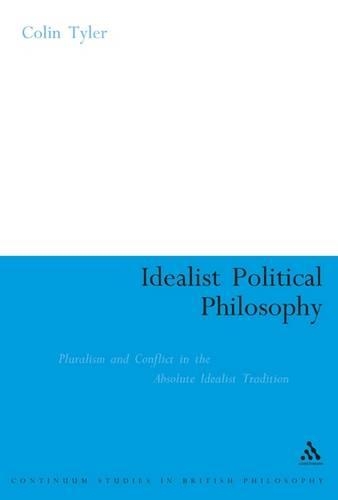
Idealist Political Philosophy: Pluralism and Conflict in the Absolute Idealist Tradition
(Paperback, NIPPOD)
Available Formats
Publishing Details
Idealist Political Philosophy: Pluralism and Conflict in the Absolute Idealist Tradition
By (Author) Dr. Colin Tyler
Continuum Publishing Corporation
Continuum Publishing Corporation
1st September 2008
NIPPOD
United States
Classifications
Professional and Scholarly
Non Fiction
Western philosophy from c 1800
320
Physical Properties
Paperback
232
Width 156mm, Height 234mm
Description
The central claim of this book is that previous scholars have not appreciated the depths and complexities of the relationships between British idealist radicalism and the earlier idealist tradition of Kant, Fichte, Hegel and Carlyle.
Colin Tyler explores two recurring themes: the first is that the foundations of British idealist thought were encapsulated within parts of Hegel's political theory that have been ignored or misunderstood -- specifically Hegel's analyses of civic pluralism and international order. Tyler argues that these parts of Hegel's system had highly significant political implications. They showed that reformers must work from within concrete historical traditions; they grounded a critique of abstract rationalism as an alienating and potentially totalitarian method of designing social and economic institutions; they indicated the inevitability of civic and political pluralism and the many opportunities for human improvement which they created; and finally they demonstrated the tragic nature of human progress.
The second recurring theme is the concern of many British idealists to articulate the distinction between the virtues of an enriching community and a modern commercial society, a concern that owed much of its force to the earlier idealist tradition. Together, these themes show the inseparability of the British idealists' social and political radicalism from the inherent logic of idealism, a link that has been denied or misconceived by previous scholars, and has never been completely appreciated by anyone before.
The book makes extensive use of certain British idealist manuscripts which were not merely unpublished, but were undiscovered until very recently.
Reviews
The book displays a number of virtues. It brings to our attention a series of thinkers influential in their day (both within the academy and without) but now all-too-often ignored. It explores the relationship between their political theories and their political commitments and argues convincingly that we should take their views seriously. As such, Idealist Political Philosophy will be of interest to political theorists (especially the last two chapters), to historians of philosophy (especially the chapters on Caird and Bosanquet), and to historians of mid- to late- nineteenth century politics (especially the chapters on Green and Caird)... For all these reasons, as well as for the clarity of the expression and the ease with which it moves from philosophical to historical to political discussion, the book is valuable and important. -- Davide Cargnello * Victorian Studies, Autumn 2009 *
mention- The Chronicle of Higher Education/ October 27, 2006
Colin Tyler's [work] fills a gap in our full appreciation of British Idealism. -- Avital Simhony, Arizona State University * Blurb from reviewer *
An original and challenging fresh look at a major school of nineteenth-century British political thought. There is no existing book which covers this range of material or raises these issues. -- Peter Nicholson, University of York * Blurb from reviewer *
...this study makes a valuable contribution to the retrieval of thinkers who long suffered from undue neglect. It whets the appetite for more... -- Douglas Moggach, University of Ottawa * Notre Dame Philosophical Reviews *
Author Bio
Dr Colin Tyler is Reader in Politics at the University of Hull, UK. He edited the Collected Works of Edward Caird as well as authoring numerous articles and book chapters.
